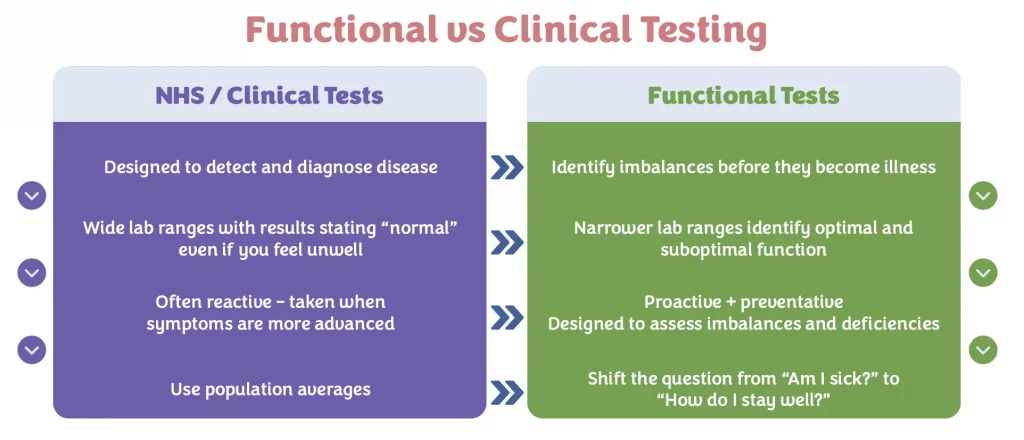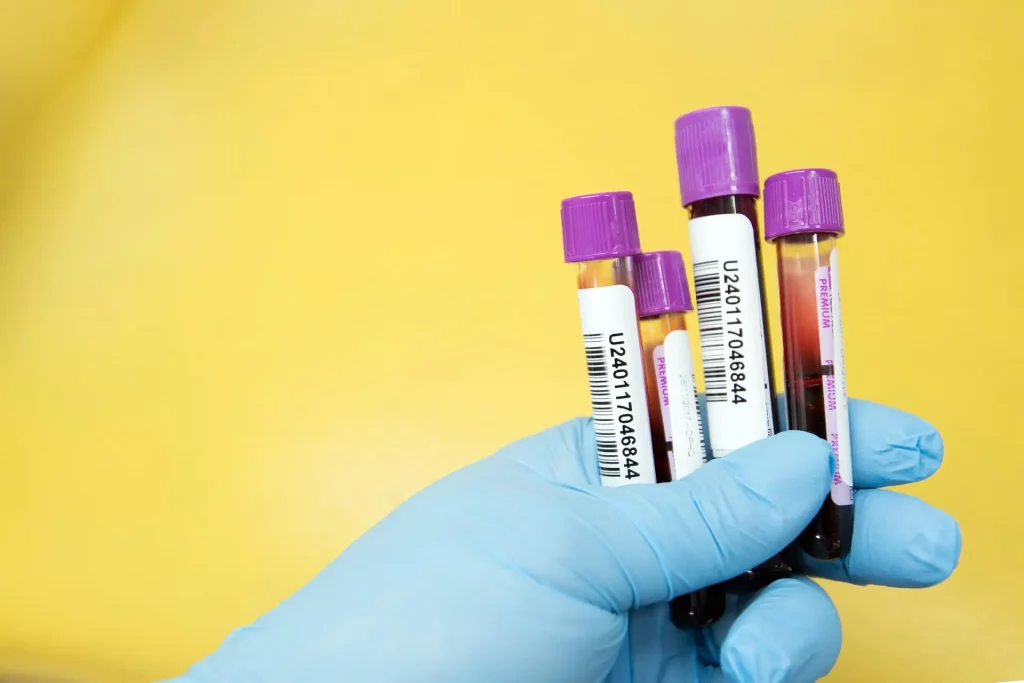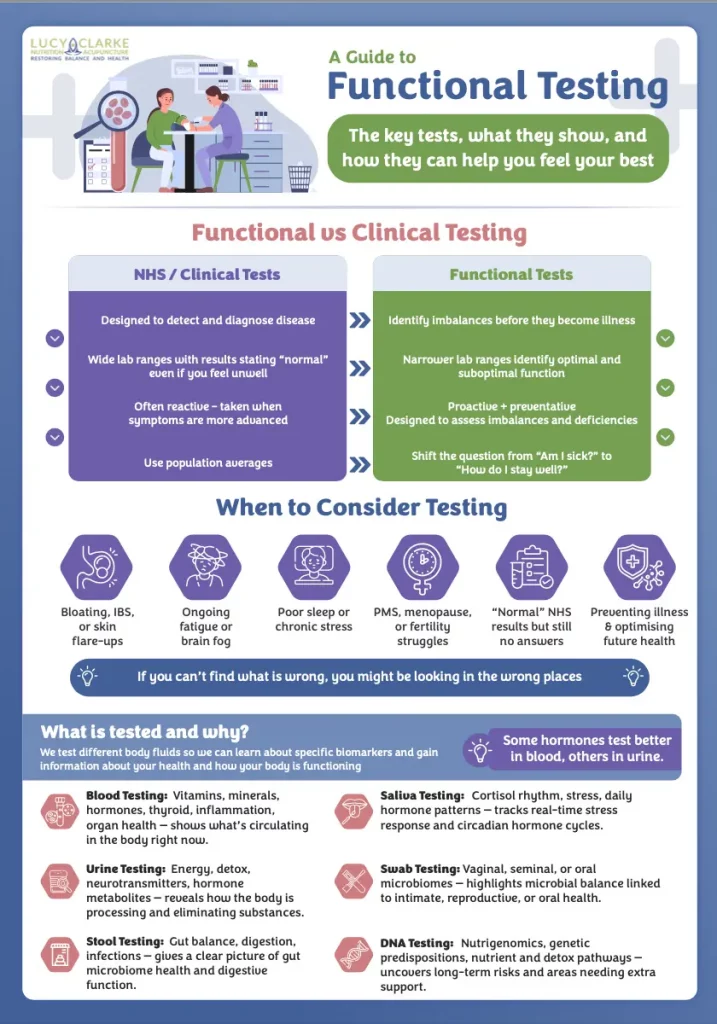If you’ve ever been told your GP blood tests are “normal,” yet you still don’t feel like yourself, you’re not alone. Many of my clients arrive at this exact point: exhausted, foggy headed, struggling with sleep or digestion, and just not functioning at their best. They don’t know why — and they’re not sure what to do next.
This is the first of two blogs where I’ll walk you through what functional testing is, how I use it with clients, and the benefits and limitations of testing.
My follow-on blog will cover my go-to tests that I use to learn more about different conditions, and symptoms. I’ll explain the importance of key biomarkers and how they inform me about your health and guide key diet and lifestyle changes.
Quick note: In this blog I’m not going to give a technical breakdown of every test -you can find that elsewhere online. Instead, my aim is to give you a clear, overview of how I use testing in clinic — and how testing could help you feel more like yourself again.
What Exactly Is Functional Testing?
Traditional medical testing looks for disease. It asks: “Does this person meet the criteria for a diagnosis?”
Functional testing takes a different approach. Instead of just ruling out illness, it looks at function – how your body is working day to day. It’s based on a “systems biology” perspective: your gut, hormones, brain, immune system, detox pathways, and energy production are all connected.
So rather than asking: “Do you have a disease?”
Functional testing asks: “What’s out of balance – and what support could bring you back to feeling your best?”
I find this especially powerful for people who fall between the cracks of conventional medicine: not “ill enough” for a diagnosis, but still not feeling well.
And it’s not just me saying this. According to BANT (British Association for Nutrition and Lifestyle Medicine), functional testing helps practitioners identify underlying imbalances that contribute to chronic symptoms. The Institute for Functional Medicine (IFM) also highlights its role in tailoring nutrition and lifestyle plans to the individual.

“Normal” Isn’t Always Optimal
This is one of the most common frustrations clients share with me:
“My doctor says everything is normal – but I still don’t feel right…”
Here’s why this happens. NHS tests compare your results to clinical reference ranges, which are designed to detect disease. Functional testing instead looks at optimal ranges – the levels your body needs to feel energised, resilient, and well.
Vitamin D – NHS reference ranges consider <50 nmol/L insufficient and <25 nmol/L deficient. But research shows vitamin D is vital for hormone balance, brain health, immunity, and bone strength — as well as prevention of type 2 diabetes, cardiovascular disease, and some cancers. In clinic, we consider 75–110 nmol/L optimal, especially important in Scotland where sunshine is scarce in autumn and winter.
Interestingly, research has identified thousands of genes regulated by vitamin D. If you carry certain genetic traits, your body may struggle to absorb or circulate vitamin D effectively — adding to the picture of insufficiency.
Vitamin B12 – The National Institutes of Health defines <250 pg/mL as subnormal. Functionally, I aim for 500–1000 pg/mL to support energy, cognition, and key biological pathways. Poor diet and gut health can reduce absorption, and groups at risk of deficiency including those eating a plant-based diet, anyone planning pregnancy, and adults over 60.

Functional Testing: What It Can (and Can’t) Tell You
Functional testing is an incredibly powerful tool, but let’s be real—it’s not a magic wand. It won’t diagnose disease overnight, and it won’t automatically fix your fatigue or digestive woes. Here’s the reality:
- Not diagnostic: Functional tests highlight imbalances or areas where your body might need support—they don’t replace your GP or give definitive disease labels.
- A snapshot in time: Your results reflect your body’s state on the day of the test. Sleep, stress, illness, or even recent diet changes can all influence outcomes.
- Context is everything: A lab report on its own won’t tell you what to do. Interpretation in the context of your symptoms, lifestyle, and health history is essential.
- Insight only matters if you act on it: Even the most detailed results are only useful if you implement changes. Functional testing works when it leads to personalised diet, lifestyle, and supplement strategies, and when you follow through consistently.
- It’s part of a bigger picture: Often, tests work best when layered together and interpreted alongside your symptoms and history and lifestyle choices. Think of them as a map—it shows where you are and where you could go, but you still need a guide to chart the route.

Why I Use Functional Testing in My Practice
For most of my clients, functional testing serves three main purposes:
- Testing to rule out: Sometimes we just need to exclude certain imbalances, like nutrient deficiencies or gut infections. This can give peace of mind and a clearer starting point.
- Testing to find out more: When symptoms don’t add up, these tests help us dig deeper. Maybe your energy is low, your digestion is off, or your mood swings aren’t explained by conventional blood tests. Functional testing can uncover patterns that would otherwise remain invisible.
- Testing as a baseline: Functional tests give us a starting line for personalised changes. By retesting over time, we can track progress, measure improvements, and tweak your diet or lifestyle interventions for optimal results.

Bringing It All Together
Functional testing has the power to:
- Provide clarity when you’re stuck and unsure what’s driving your symptoms.
- Personalise your health plan, making recommendations specific to your body and lifestyle.
- Uncover hidden imbalances that might never show up on standard blood tests.
- Give you a roadmap to feeling better—energy, mood, digestion, sleep, and resilience..
But—and this is key—it only works if it’s actionable. That’s where I come in. Together, we interpret the results, pinpoint what really matters, and use them to guide practical changes that fit your life
What does Functional Testing Involve
If you’re curious about functional testing, here’s how it usually works in my clinic:
- Initial discussion: We review your symptoms, lifestyle, and health history.
- Test selection: Together, we choose the right test(s) for your goals. This could be a gut panel, hormone assessment, micronutrient check, or multiple layered tests.
- Interpretation and planning: Once results arrive, we unpack what they mean for your health.
- Personalised recommendations: Diet, lifestyle, supplement protocols, and practical strategies.
- Follow-up and review: Reassess, track progress, and adjust the plan as your body responds.
Next Steps…
If you’re thinking about whether functional testing could help you, here are two easy ways to start:
- Book a free 15-minute discovery call to discuss your symptoms, history, and the tests that might suit you.
- Sign up for my free Guide to Functional Testing to get a clear overview of tests, what they show, and how to use the results.
References & Resources
- Institute for Functional Medicine (IFM): https://www.ifm.org/
- British Association for Nutrition and Lifestyle Medicine (BANT): https://bant.org.uk/
- Vitamin D:
- Vitamin B12:





